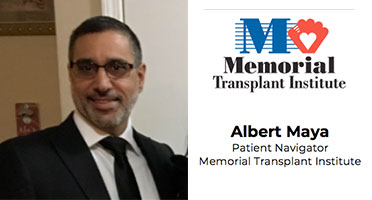Matters of the Heart
February 03, 2020

February is “Heart Month” and since heart health is an important part of Memorial's mission, this month we're featuring a member of the heart transplant team.
Albert Maya, patient navigator for Adult Heart Transplant and Ventricular Device, says he forms "very close bonds" with all of his patients.
That’s because Albert spends a lot of time interacting with cardiac patients to assist them with all of the necessary paperwork and litany of tests that are needed before and after a heart transplant.
Every patient who comes in needing a heart transplant or a ventricular assist device must be evaluated, and the first step is getting authorizations from the patient's insurance company.
Albert works with the internal finance team to get the required authorizations, then consults with the patient to review everything: paperwork, informed consent, the evaluation process, the transplant waitlist, and all items the patient is expected to do throughout the process.
While every individual has different needs, Albert says he schedules anywhere from 17 to 22 evaluation appointments for his patients. He’s there for them every step of the way and makes sure the transplant coordinators have everything they need when they present the heart transplant candidate to the heart transplant selection committee.
Patients who make it on the waitlist must visit the office often to undergo a cardiac catheterization every three months and have labs administered once a month until the transplant occurs. After the transplant surgery, patients must follow a specific protocol for an entire year.
Albert ensures that all of the proper authorizations are obtained for all of the necessary testing, labs, catheterizations, office visits and any other tests doctors deem necessary post transplant.
For patients who need a ventricular assist device, Albert arranges office visits, labs, follow-up care and any other necessary medical care. Some patients use a ventricular assist device as a bridge to transplant, while others may not be a good candidate for a transplant so they will rely on a ventricular assist device to improve their quality of life.
Albert’s career journey has taken many twists and turns. "Growing up as a kid, I always wanted to be a firefighter, but I couldn't do that because I have asthma," Albert recalls.
With a passion for music, Albert attended Miami Dade College and then transferred to The Art Institute for an audio engineer degree.
In the meantime, he worked in his family’s business in the area of international sales. About five years ago, he was given the opportunity to pursue a medical career. He was hired as a patient access assistant for cardiac services at Memorial.
"I took the job and picked it up quickly because I found it interesting and was so excited to finally be working in the medical field,” he says.
After two years Albert wanted something more challenging where he could truly connect and make a difference in patients’ lives.
He applied for a navigator position for the heart transplant team and got the position and has been in the role for the last two years.
Since then, he's been offered other positions that come with higher pay, but Albert says he loves the patients and his team and doesn't want to take on a new role.
"I'm so thankful every day," says Albert, who truly enjoys the patient interaction that comes with the job. “I find my job so rewarding.”
